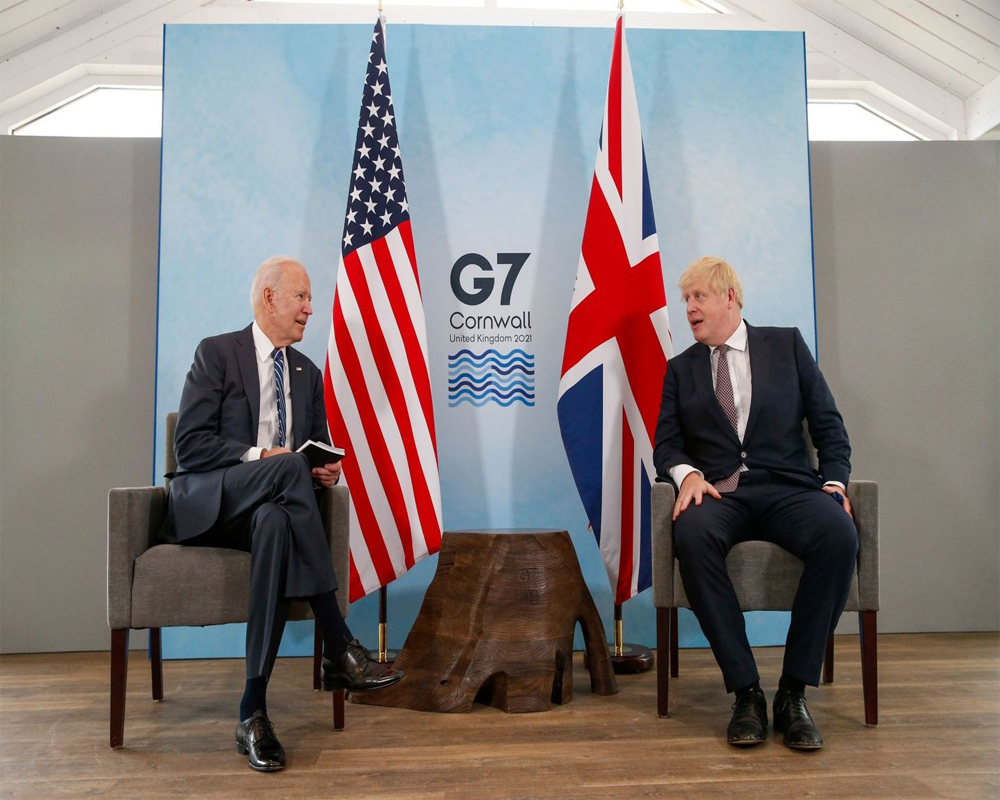The Group of Seven nations are set to commit to sharing at least 1 billion coronavirus shots with the world, British Prime Minister Boris Johnson has announced, with half coming from the U.S. And 100 million from the UK as President Joe Biden urged allies to join in speeding the pandemic's end and bolstering the strategic position of the world's wealthiest democracies.
Johnson's announcement on the eve of the G-7 leaders' summit in England came hours after Biden committed to donating 500 million COVID-19 vaccine doses and previewed a coordinated effort by the advanced economies to make vaccination widely and speedily available everywhere.
"We're going to help lead the world out of this pandemic working alongside our global partners," Biden said, adding that on Friday the G-7 nations would join the US in outlining their vaccine donation commitments. The G-7 also includes Canada, France, Germany, Italy and Japan.
The prime minister's office said the first 5 million UK doses would be shared in the coming weeks, with the remainder coming over the next year. Biden's own commitment was on top of the 80 million doses he has already pledged to donate by the end of June.
"At the G7 Summit I hope my fellow leaders will make similar pledges so that, together, we can vaccinate the world by the end of next year and build back better from coronavirus," Johnson said in a statement referencing the U.S. President's campaign slogan.
Earlier on Thursday, French President Emmanuel Macron welcomed the US commitment and said Europe should do the same. He said France would share at least 30 million doses globally by year's end.
"I think the European Union needs to have at least the same level of ambition as the United States," he said at a news conference. He added that time was of the essence, saying, "It's almost more important to say how many (doses) we deliver the next month than making promises to be fulfilled in 18 months from now."
The G-7 leaders have faced mounting pressure to outline their global vaccine sharing plans, especially as inequities in supply around the world have become more pronounced. In the US, there is a large vaccine stockpile and the demand for shots has dropped precipitously in recent weeks.
Biden predicted the US doses and the overall G-7 commitment would "supercharge" the global vaccination campaign, adding that the US doses come with no strings attached.
"Our vaccine donations don't include pressure for favours or potential concessions," Biden said. "We're doing this to save lives, to end this pandemic, that's it." He added: "Our values call on us to do everything that we can to vaccinate the world against COVID-19."
The U.S. Commitment is to buy and donate 500 million Pfizer doses for distribution through the global COVAX alliance to 92 lower-income countries and the African Union, bringing the first steady supply of mRNA vaccine to the countries that need it most.
The Pfizer agreement came together with some urgency in the last four weeks at Biden's direction, said a senior White House official, both to meet critical needs overseas and to be ready for announcement at the G-7.
The official, who spoke on condition of anonymity to discuss internal plans, added that the Biden administration was to apply the same wartime posture applied to the vaccine rollout in the U.S. To its effort to share vaccines globally.
Biden said the 500 million US-manufactured vaccines will be shipped starting in August, with the goal of distributing 200 million by the end of the year. The remaining 300 million doses would be shipped in the first half of 2022.
A price tag for the doses was not released, but the U.S. Is now set to be COVAX's largest vaccine donor in addition to its single largest funder with a $4 billion commitment.
The well-funded global alliance has faced a slow start to its vaccination campaign, as richer nations have locked up billions of doses through contracts directly with drug manufacturers. Biden's move, officials said, was meant to ensure a substantial amount of manufacturing capacity remains open to the wealthy nations.
Just last month, the European Commission signed an agreement to purchase as many as 1.8 billion Pfizer doses in the next two years, a significant share of the company's upcoming production — though the bloc reserved the right to donate some of its doses to COVAX.
COVAX has distributed just 81 million doses globally and parts of the world, particularly in Africa, remain vaccine deserts.
White House officials said the ramped-up distribution program fits a theme Biden plans to hit frequently during his week in Europe: that Western democracies, and not authoritarian states, can deliver the most good for the world.
US national security adviser Jake Sullivan told reporters Wednesday that G-7 leaders are "converging" around the idea that vaccine supply can be increased in several ways, including by countries sharing more of their own doses, helping to increase global manufacturing capacity and doing more across the "chain of custody" from when the vaccine is produced to when it is injected into someone in the developing world.


























